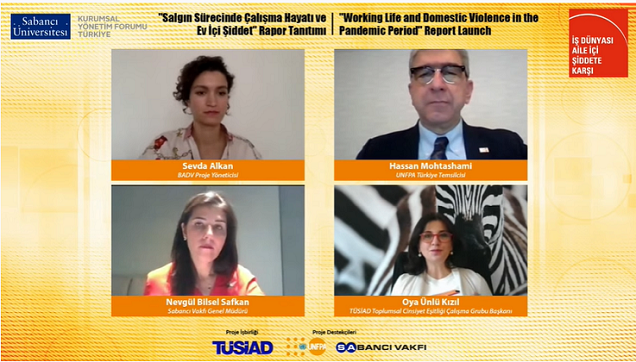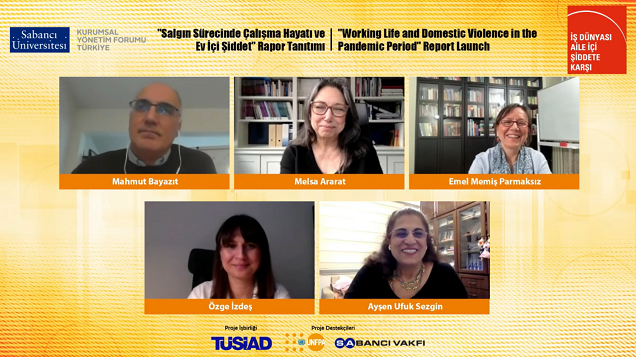19/06/2021
‘The Report on Working Life and Domestic Violence During the Pandemic’, prepared within the framework of the ‘Business Against Domestic Violence (BADV) Project’ carried out by the Sabancı University Corporate Governance Forum of Turkey (CGFT) and supported by the United Nations Population Fund (UNFPA) and the Sabancı Foundation in collaboration with TÜSİAD, indicates that domestic violence suffered by working women grew during the pandemic.
According to the report, 62% of working women had been exposed to at least one type of violence over the previous 3 months. The type of violence that working women were exposed to the most was psychological violence, at 58%. The amount of working women experiencing social violence was 15%, physical violence 12%, and sexual violence 9%.

The Sabancı University Corporate Governance Forum of Turkey disclosed ‘The Report on Working Life and Domestic Violence During the Pandemic’ in an online meeting prepared within the framework of the ‘Business Against Domestic Violence (BADV) Project’, started in 2014 by the CGFT and supported by the United Nations Population Fund (UNFPA) and the Sabancı Foundation in collaboration with TÜSİAD.
According to the report, 62% of working women were exposed at least once to at least one type of domestic violence over the last 3 months. The type of violence that working women were exposed to the most was psychological violence with 58%, followed by social violence at 15%, physical violence at 12%, and sexual violence at 9%.
The BADV Project is aimed at implementing support mechanisms in the workplace and promoting tools, methods and best practices to reduce domestic violence using businesses' managerial and organizational capabilities. As of end of 2020, the number of companies included in the project reached 73, and the number of employees covered reached 183,215. The research on ‘Working Life and Domestic Violence During the Pandemic’, which was the theme of the report, was designed to find out the impact of domestic violence suffered by individuals during the COVID-19 pandemic on their working environment and working life. The research further intends to make additional recommendations to companies to prevent working women from being negatively affected by working from home practices and support gender equality in the workplace in the light of collected data and analyses.
At the beginning of the meeting, Hassan Mohtashami, UNFPA Turkey Representative, Nevgül Bilsel Safkan, Sabancı Foundation General Manager, and Oya Ünlü Kızıl, Chair of TÜSİAD Gender Equality Working Group shared their assessments of the report.
Hassan Mohtashami, UNFPA Turkey Representative, said that during the COVID-19 pandemic, women and girls became more vulnerable to domestic violence, and restricted access to sexual and reproductive health services, in addition to deepening economic and social stress, had added to this. Mohtashami commented on the report as follows:
The ‘Business Against Domestic Violence (BADV) Project’ is a successful project indicating to the private sector that it can play an active role in establishing mechanisms to prevent gender-based violence in workplaces and intervene in such gender-based violence cases. As proven by this report, the companies involved in the BADV project were able to offer more effective and resilient prevention and intervention mechanisms so that their employees could get effective support during the pandemic. However, the report also shows that we are not done yet. It is essential for us to intensify our efforts to eliminate domestic violence and further increase the existing momentum to prioritize the voices, experiences and needs of women in workplaces. It is time to take action and say no to violence every day, not just on one day.”
Nevgül Bilsel Safkan, Sabancı Foundation General Manager pointed out that, with the pandemic, women had a growing burden of domestic and childcare labor, and were exposed to domestic violence to a greater extent. She continued, “To enhance their effective roles in combatting domestic violence, companies should raise awareness of employees about current policies, and inform managers about indications of violence. It is equally important to provide institutional support for women working from home so that they can establish work-life balance. To minimize negative effects of the pandemic on women’s human rights, it is very important to identify needs through scientific research and shape our efforts in the light of priorities. Companies that are trained and develop policies in the framework of the BADV project not only ensure the equality of their employees, but also contribute considerably to social justice. I invite the whole business world to develop and implement policies to fight domestic violence against women, and I hope this report will guide businesses in doing so.”

In her assessment of the report, Oya Ünlü Kızıl, Chair of TÜSİAD Gender Equality Working Group said that one of the most important contributions of the Business Against Domestic Violence Project was regular provision of gender-segregated data about the impact of the pandemic. Oya Ünlü Kızıl emphasized that it was not possible to fully eliminate violence against women before gender equality was secured. She further commented, “Keeping in mind that you cannot manage what you cannot measure, I believe that the inequalities facing women should be visible so that we can design effective interventions. In other words, it is very important to collect gender-segregated data and information about the effects of the pandemic regularly. I think one of the most important contributions of the Business Against Domestic Violence Project is the provision of gender-segregated data regarding this field. In addition, it is very important that strategies and actions of companies to ensure gender equality continue and are further strengthened. It is not possible to fully eliminate violence against women before gender equality is secured. The hierarchy created by social roles and expectations leads to the fact that women are discriminated against and/or face violence in every walk of life, from family life to education, employment and politics. The number of companies that sign WEPs, that are involved in the Business Against Domestic Violence Project, or make efforts for gender equality should grow. We should all make efforts for this to happen. It is very important. It is critical to plan egalitarian and transformative interventions to prevent gender inequalities from deepening further, particularly in times of crisis, and this can only be achieved through cooperation between the private sector, NGOs and the public sector.”
The meeting also featured a panel on ‘Impact of Overlapping Work and Life Venues on Working Women: Lessons from the Pandemic’ facilitated by Melsa Ararat, Director and Principal Researcher of Sabancı University Corporate Governance Forum.
Outputs of the Report on Working Life and Domestic Violence During the Pandemic
76% of female respondents and 53.5% of male respondents spend more time on domestic work than the pre-pandemic period.
Survey results indicate that in cases when women work from home, men in some households attribute some tasks that they used to assume before the pandemic to their wives.
38.8% of all respondents prefer to go back to work at their workplace when the pandemic is over and social distancing rules are lifted, while 41.7% prefer to work from home a couple of days a week.
Post-pandemic work preferences of participants living with their spouse or fiancée vary according to gender and the time they spend on domestic work. Although women in general prefer to work from home more than men, this preference of theirs reduces in proportion to the extent to which they assume domestic work.
When the survey participants were asked about the importance they attach to the measures taken and support mechanisms offered by their employers during the COVID-19 process, respondents listed the most important means of support as occupational health and safety measures (87.8%), paid sickness leave (84.3%) and paid urgent care leave (76.5%).
Results show that 62% of working women were exposed at least once to one type of violence over the last 3 months.
As in previous research, the most frequently faced type of violence was psychological violence (58%), followed by social violence (15%), physical violence (12%) and sexual violence (9%).
5% of men declared they had demonstrated violent behavior against their spouse. When asked about the reasons for their violent behavior, they named economic problems and issues about their children, the two leading reasons in half of the cases.
Nearly half of the women suffering violence said they did not share this situation with anyone, and it is interesting that no woman shared it with their employer.
It can be understood that women working for companies involved in the BADV project and aware of the workplace policy against violence suffer less from psychological stress than women working in other workplaces and declaring their workplace has no policy against violence.
Research Method:
The survey method was used in the research, and the survey was applied online from June 18 to August 31, 2020. The survey took nearly 10 minutes to complete and links to the survey were sent to 73 companies, which were involved in the BADV project from 2016 to 2020. Managers of these companies forwarded the link for the survey to their employees by email. In addition, the survey was shared on social media and reached employees of companies that are not involved in the BADV project. Employees from 37 BADV-affiliated companies participated in the survey. The total number of participants was 1,261.
You can access all BADV-related work through https://badv.sabanciuniv.edu/library/research-and-publications .




